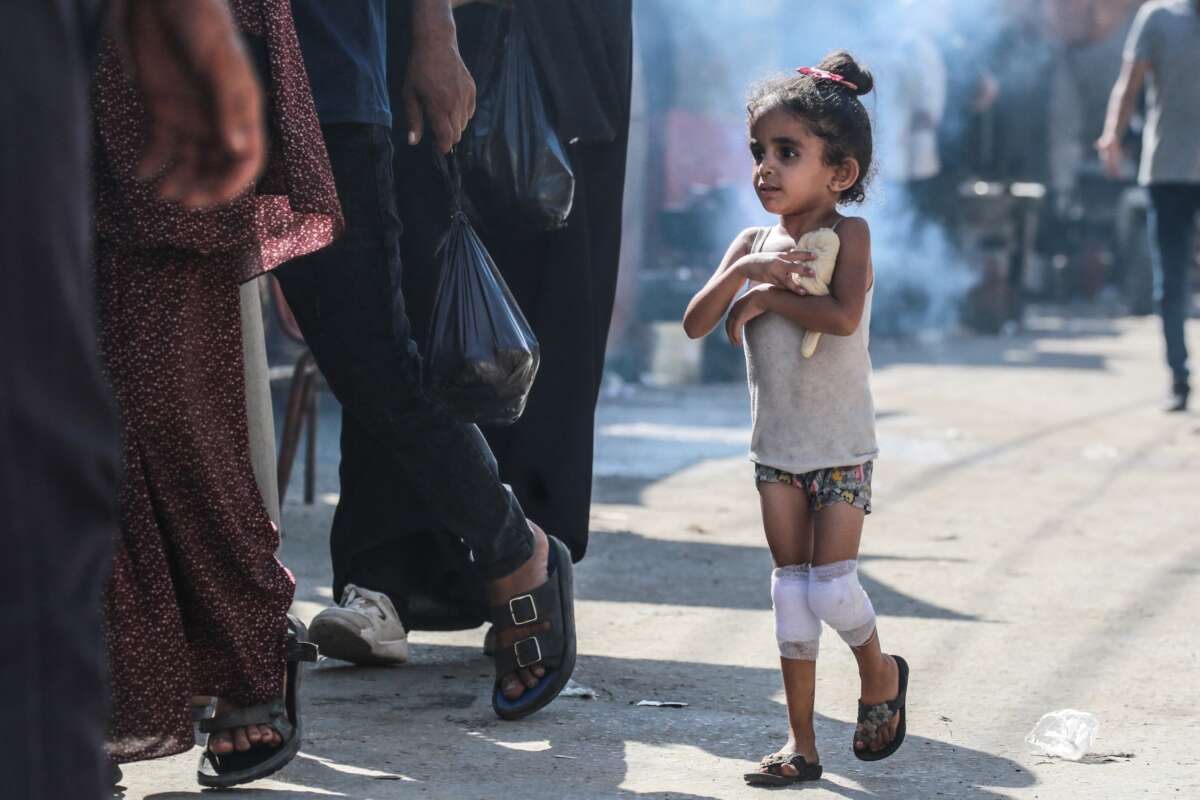Honest, paywall-free news is rare. Please support our boldly independent journalism with a donation of any size.
The World Health Organization (WHO) is warning that “catastrophic hunger” and conditions resembling famine are spreading across Gaza and that thousands of young children and babies are starving due to Israel’s starvation campaign.
“A significant proportion of Gaza’s population is now facing catastrophic hunger and famine-like conditions,” WHO Director-General Tedros Adhanom Ghebreyesus said in a press briefing on Wednesday. “Despite reports of increased delivery of food, there is currently no evidence that those who need it most are receiving sufficient quantity and quality of food.”
Officials have reported at least 32 people in Gaza dying of starvation so far, including 28 children under 5, Tedros said. The actual number of deaths from starvation may be much higher, with hundreds of thousands of Palestinians having faced famine for months now.
Tedros added that over 8,000 children under the age of 5 in Gaza have been diagnosed with acute malnutrition, with 1,600 of these children facing severe acute malnutrition. But due to Israel’s campaign to systematically destroy health care across the region, there are only two centers in Gaza that are able to treat children suffering from malnutrition, the WHO official said.
Many starving children in Gaza are unable to access health care. UNICEF reported this week that Israel’s raid of Rafah has cut nearly 3,000 children in southern Gaza off from treatment for moderate and severe acute malnutrition — representing three-quarters of the 3,800 children who were receiving treatment for hunger in southern Gaza before Israel’s Rafah invasion.
These children are at “immediate and serious risk of becoming critically ill, acquiring life-threatening complications, and joining the growing list of boys and girls who have been killed by this senseless, man-made deprivation,” said Adele Khodr, UNICEF’s Middle East and North Africa regional director.
Israel’s intensified violence in the West Bank is also obstructing access to health care, Tedros said, with 508 Palestinians killed in the West Bank since October.
“In most areas of the West Bank, clinics are only operating two days a week, and hospitals are operating at about 70 percent capacity. Illegal settlements have expanded in the occupied West Bank, impacting the population’s access to health services,” Tedros said.
Israel’s manufactured starvation crisis in Gaza is only slated to get deadlier. Israeli forces have implemented a near-total blockade of humanitarian aid in the past month, with only 1 percent of the aid that humanitarian groups say is needed entering Gaza on average since Israel seized the Rafah crossing in May.
The UN has warned that over 1 million Palestinians could be experiencing famine-level hunger by mid-July — up from the roughly 677,000 people who were undergoing famine-level hunger in March, according to food insecurity researchers.
A recent report by the Famine Early Warning Systems Network, which is funded by the U.S. Agency for International Development (USAID), found that famine is likely already occurring in northern Gaza. Advocacy groups have called for international officials to make a formal declaration of famine in Gaza, as hunger experts have said that Israel’s brutal violence in Gaza is making it difficult to gather the data necessary to make that determination.
Due to the hunger campaign, the UN concluded that Israel is using starvation as a weapon of war in a report released this week accounting for Israel’s alleged violations of international law in Gaza between October and December of 2023.
Not only is Israel blocking food from entering Gaza, it has also destroyed huge swaths of agricultural land in the region, preventing Palestinians from growing their own food while depriving them of nearly all resources from outside Gaza.
On Thursday, the UN’s Satellite Center and Food and Agriculture Organization released a report revealing that Israel has damaged 57 percent of permanent crop fields and arable land in Gaza, citing a “notable rise in the destruction of orchards and other trees, field crops and vegetables.”
A terrifying moment. We appeal for your support.
In the last weeks, we have witnessed an authoritarian assault on communities in Minnesota and across the nation.
The need for truthful, grassroots reporting is urgent at this cataclysmic historical moment. Yet, Trump-aligned billionaires and other allies have taken over many legacy media outlets — the culmination of a decades-long campaign to place control of the narrative into the hands of the political right.
We refuse to let Trump’s blatant propaganda machine go unchecked. Untethered to corporate ownership or advertisers, Truthout remains fearless in our reporting and our determination to use journalism as a tool for justice.
But we need your help just to fund our basic expenses. Over 80 percent of Truthout’s funding comes from small individual donations from our community of readers, and over a third of our total budget is supported by recurring monthly donors.
Truthout has launched a fundraiser to add 500 new monthly donors in the next 10 days. Whether you can make a small monthly donation or a larger one-time gift, Truthout only works with your support.
